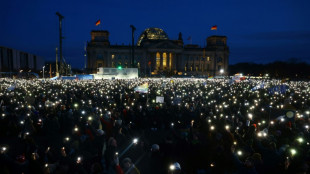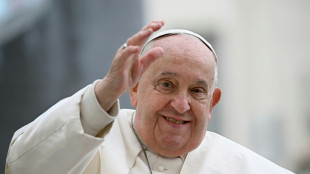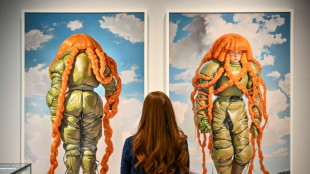
-
 Ukraine's earth riches are rare and difficult to reach
Ukraine's earth riches are rare and difficult to reach
-
Cook Islands strikes deal with China on seabed minerals

-
 Highlights from Berlin as film festival wraps up
Highlights from Berlin as film festival wraps up
-
Disinformation blizzard targets Germany before election

-
 Bibas mother confirmed dead as Gaza hostage-prisoner swap set to go ahead
Bibas mother confirmed dead as Gaza hostage-prisoner swap set to go ahead
-
Cavs crush Knicks in battle of NBA East elite

-
 The last carriage horses of Indonesia's capital endure harsh lives
The last carriage horses of Indonesia's capital endure harsh lives
-
Gaza hostage-prisoner swap set to go ahead after row over bodies

-
 Australia says China has not explained naval live-fire warning
Australia says China has not explained naval live-fire warning
-
On $15 a month, Venezuela's teachers live hand to mouth

-
 Reds boss Kiss hails resilience in 13-try Super Rugby extravaganza
Reds boss Kiss hails resilience in 13-try Super Rugby extravaganza
-
Porn stars: Oscar favorite 'Anora' gets sex work right

-
 Arab leaders meet in Saudi Arabia to hash out Gaza plan
Arab leaders meet in Saudi Arabia to hash out Gaza plan
-
South Africa's Potgieter fires 61 to grab PGA Mexico Open lead

-
 LA prosecutor says opposes new trial for Menendez brothers
LA prosecutor says opposes new trial for Menendez brothers
-
Australia says no live firing seen or heard from Chinese ships

-
 US proposes Ukraine UN text omitting mention of occupied territory: diplomats
US proposes Ukraine UN text omitting mention of occupied territory: diplomats
-
Trump says Zelensky and Putin must 'get together'

-
 AP sues White House officials over denial of access
AP sues White House officials over denial of access
-
Everton boss Moyes doing a better job than me, says Man Utd's Amorim

-
 'See you in court': Trump, governor spar over trans rights
'See you in court': Trump, governor spar over trans rights
-
US stocks tumble on fears of slowdown

-
 Champions Spain fight back in Women's Nations League opener, England held
Champions Spain fight back in Women's Nations League opener, England held
-
M23 pushes deeper in east DRC, UN urges Rwanda forces to leave

-
 Leicester hit historic low in Brentford rout
Leicester hit historic low in Brentford rout
-
LA mayor sacks fire chief over handling of deadly blazes

-
 Suspect arrested after stabbing at Berlin's Holocaust memorial
Suspect arrested after stabbing at Berlin's Holocaust memorial
-
Cuba opens solar park hoping to stave off blackouts

-
 'Super tough' Rublev in third Qatar final, faces Draper for title
'Super tough' Rublev in third Qatar final, faces Draper for title
-
Yankees change facial hair policy to allow 'well-groomed beards'

-
 'History will not forgive' failure to seal pandemic deal: WHO chief
'History will not forgive' failure to seal pandemic deal: WHO chief
-
There's optimism Wembanyama will make strong recovery

-
 Cognac on the rocks: industry seeks French govt help from Chinese tariffs
Cognac on the rocks: industry seeks French govt help from Chinese tariffs
-
Texas measles outbreak reaches 90, mostly unvaccinated

-
 Holders Spain stun Belgium with late comeback in women's Nations League
Holders Spain stun Belgium with late comeback in women's Nations League
-
Man badly wounded in suspected stabbing at Berlin's Holocaust memorial

-
 Ex-Trump aide's 'Nazi ideology' salute sparks French party leader's protest
Ex-Trump aide's 'Nazi ideology' salute sparks French party leader's protest
-
Man found guilty of trying to kill Salman Rushdie

-
 Man badly wounded in assault at Berlin's Holocaust memorial: police
Man badly wounded in assault at Berlin's Holocaust memorial: police
-
USA needs travel reforms to cope with mega sports events: report

-
 World champion Brignone storms to Sestriere giant slalom
World champion Brignone storms to Sestriere giant slalom
-
'Unknown little Englishman' Sherratt hoping to reverse Welsh fortunes

-
 Pope not out of danger, doctors say, amid questions over future
Pope not out of danger, doctors say, amid questions over future
-
Christie's first-ever AI sale angers some artists

-
 M23 advances deeper in east DRC as Congolese troops flee
M23 advances deeper in east DRC as Congolese troops flee
-
German flying taxi start-up's rescue deal collapses

-
 Court of Arbitration for Sport rejects Rubiales ban appeal
Court of Arbitration for Sport rejects Rubiales ban appeal
-
S.Africa wants 'inclusive' talks on ending Ukraine war, invites Zelensky

-
 Postecoglou wants Spurs to 'kick on' after turning corner
Postecoglou wants Spurs to 'kick on' after turning corner
-
Rickelton hits century as South Africa rout Afghanistan in Champions Trophy


Oscar setback, Trump cast shadow over queer film
This year might have been a highpoint for LGBTQ representation in film, but an ill-fated Oscar nomination combined with Donald Trump's backlash against trans people have left the queer cinema community disappointed and on the defensive.
The first-ever Best Actress Oscar nomination for a transgender person -- Spanish actress Karla Sofia Gascon, who stars in awards season favourite "Emilia Perez" -- was initially seen by many as a potential breakthrough moment.
But her fall from grace due to racist social media posts and unease among many trans people about "Emilia Perez" director Jacques Audiard's handling of her gender identity have undermined the sense of achievement.
"I would love for a trans person to win an Academy Award... but representation without input from the audience being represented or from the community being represented, is always going to fall flat," Allegra Madsen told AFP.
Madsen runs the Frameline festival of queer film in San Francisco and is a member of the three-person jury set to hand out the Teddy Award this weekend at the Berlin film festival, the oldest festival award for queer movies.
The "queer" category covers everything from films that portray non-heterosexual characters and themes, to those with LGBTQ people in leading acting roles or behind the camera.
Around 30 movies and documentaries are competing.
In the current context, with trans rights under attack in America under Trump and from other conservative politicians in Europe, the awards have taken on new significance.
"It's a hard moment," Madsen said. "Everyone feels like we're at the start of a long, hard slog."
- Fight again -
Trump has moved swiftly to roll back gains for trans people since returning to power a month ago, announcing that the US would only recognise two genders, banning trans soldiers, and restricting transition procedures.
The film industry is still waiting to know the extent of his designs on America's cultural output, with the former reality TV star vowing to combat "anti-American propaganda".
How far will film studios, streaming platforms and distributors go to please him, avoiding films viewed as being too "woke"? Will he cut back already small US federal arts funding?
Madsen, 45, views the trans backlash as a reaction to societal progress over the last decade, with Trump serving as a sort of reverse pendulum swing that will be less significant than the initial movement.
"There wouldn't be such a violent swing if it weren't a response to something. It's a response to success," she said.
Like her, American director Todd Haynes, who heads the overall Berlinale film jury this year, believes that the LGBTQ community at large and filmmakers specifically are entering a new phase in their fight for acceptance.
"I think we haven't realised how much everything is suddenly at stake," the director of "Carol", who is gay, told AFP this week. "It means we all have to start fighting for all the things we've been fighting for in the past, all over again."
- 'Frightening' -
For younger trans filmmakers like Paula Tomas Marquez, who has only known gradual gains in acceptance of non-conforming people over her adult lifetime, the changing political environment seems more worrying.
Marquez's first feature film "Two Times Joao Liberado", featuring a trans woman in the lead role, was chosen for the secondary Panorama section of the Berlin film festival and is in the running for a Teddy.
"It's frightening what's happening now," the 30-year-old told AFP at the Berlinale. "It's normalising hate speech."
Films about LGBTQ people can "be a political tool to create empathy", she said.
When asked about "Emilia Perez", she declined to comment.
"Two Times Joao Liberado" features a heterosexual director trying clumsily to make a film with a trans actress.
Might there be parallels with Audiard, the well-meaning veteran French director of "Emilia Perez", who critics have accused of reinforcing trans stereotypes?
"Not all representation is good representation," said "Two Times Joao Liberado" producer Cristiana Cruz Forte.
"That's it," agreed Marquez.
A.Gasser--BTB
